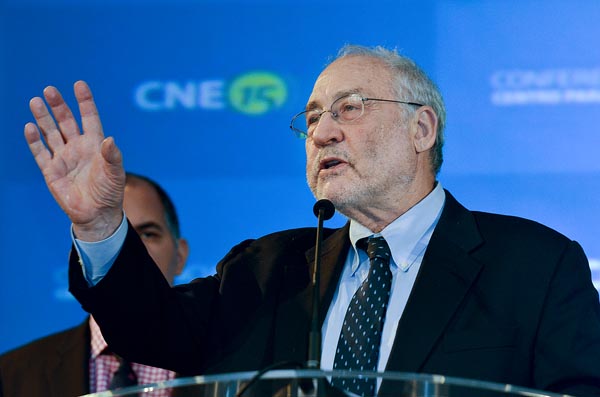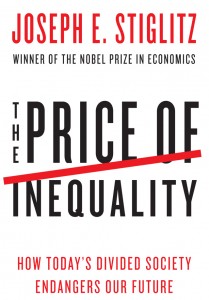Stiglitz: ‘Puerto Rico, don’t let this crisis go to waste’

By Michelle Kantrow-Vázquez and Lorraine Blasor
Puerto Rico needs to make “clear demands” to the U.S. government regarding what is needed to pull through its present difficulties, including requesting more flexibility with the Jones Act, a legislation that is also hurting Hawaii.
So suggested Economist and 2001 Nobel laureate in Economic Sciences Joseph Stiglitz, keynote speaker at the Center for a New Economy’s annual conference, who also said Puerto Rico “can’t let this crisis go to waste.”
“When you face a crisis both in the public and private sector, hopefully it focuses attention on what needs to be done and what can be done and go beyond the simplistic solutions of “’we have to tighten our belt’,” he said.
“We have to tighten our belt may not be the answer. Yes, you may have to, but that’s only the beginning of the discussion, not the end of the discussion,” he said. “This is where I think civil society discussions become very important, because there’s no monopoly on good ideas in society. You should not just look to the politicians as the source of ideas.”
Saying “there’s no magic bullet” or a single policy to solve Puerto Rico’s problems, Stiglitz suggested there are both short- and long-term solutions the island could consider to address its problems.
For one, he said Puerto Rico has to look at its high electricity prices, which are a problem for development. Furthermore, he said the island needs to invest in education, because “doing so will be felt in the long-term and not doing so will also be felt in the long-term.”
“Something Puerto Rico can do fairly quickly, however, is to start putting pressure on the U.S. government, which may have more resonance now that there’s a crisis than they may have had 20 years ago,” Stiglitz said.
The island needs to ask the U.S. government to revisit the Jones Act and the extra costs abiding by the law represents for Puerto Rico. Another issue he said should be brought into focus is the way U.S. transfer programs are structured, which he said are not designed for an economy with a per capita income such as Puerto Rico’s.
“Tell the U.S. you need more flexibility, not more money, to design a program more appropriate to your conditions. If they say no, then you’ve at least tried,” he said. “It at least makes it clear that you’ve tried and it changes the debate in the U.S.”
He also said Puerto Rico needs to tap into the large Hispanic movement stateside, some of which feel very intensely about the island’s issues.
“If there were a well-articulated agenda it would get a lot of support,” Stiglitz said. “Will there be enough to push it over the line? If you don’t start pushing, you won’t go over the line. I think there is a lot of possibility.”
 U.S. has ‘failed to deal with fundamentals problems’
U.S. has ‘failed to deal with fundamentals problems’
Stiglitz, considered among the most influential economists in the world, offered his take on the island following a speech that swept broadly over the economy and the issue of inequality, the subject of his 2012 bestseller, The Price of Inequality.
In a speech offered earlier in the day at the University of Puerto Rico, Stiglitz said the U.S. has failed to deal with the economy’s fundamental problems.
The U.S. economy was sick even before the recent financial crisis but “we have not dealt with [the] fundamental problems,” he said.
For example, the U.S. economy requires a structural reform to address the decline of manufacturing and the fact that productivity has outpaced growth and demand, causing a drop in employment. Since markets don’t do restructuring well, the government needs to take the lead, he said.
The U.S. is not investing in technology and infrastructure, both of which are important to economic growth. U.S. economic growth is “15 percent below our potential.”
Another problem is the dysfunctional financial system. Prior to the crisis, the sector concentrated on predatory lending and anti competitive practices; past the crisis, this sector continues to thrive on speculation instead of “the core business of lending.”
Flow of credit to small and medium-size business is below what it was before the financial crisis.
The U.S. has become a rent seeking economy based on appropriating wealth as exemplified by large monopolies like telecoms that charge telephone rates 10 times higher than is charged in more competitive economies like India. He also lambasted U.S. CEOs for earning 250 to 300 times more than the average workers.
According to Stiglitz, inequality is growing in most though not all countries; for example, he praised Brazil for investing in education and increasing access to food and medicine.
“America has the most inequality of any advanced country,” he said.
Inequality exacts an economic price but also has “severe political and social consequences,” with implications for democracy.
Inequality of opportunities is the result of policies and politics. Take trickle down economics, founded on the idea that giving money to the top would trickle down to the masses.
“Trickle down economics does not work. If it worked, we would be doing very well,” he said. Instead, “We have thrown a lot of money at the top and they are doing very, very well.”
The median family income in the U.S. is lower today than it was two decades ago.















